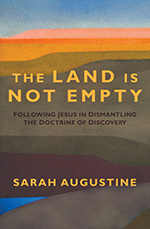Reviewed by Amanda Geers
 Both a memoir of her fight for justice and a prophetic call to the Church, Sarah Augustine takes us through her story of learning the impact of the Doctrine of Discovery: how it shaped the colonization and taking of land historically, the ways the Church and governments have benefited together from these set of legal decrees, bulls, etc., the long term impact on Native families and individuals, and how even today it is allowing land theft to be perfectly legal particularly in countries in South America, and supports efforts to claim resources from Native owned lands in North America.
Both a memoir of her fight for justice and a prophetic call to the Church, Sarah Augustine takes us through her story of learning the impact of the Doctrine of Discovery: how it shaped the colonization and taking of land historically, the ways the Church and governments have benefited together from these set of legal decrees, bulls, etc., the long term impact on Native families and individuals, and how even today it is allowing land theft to be perfectly legal particularly in countries in South America, and supports efforts to claim resources from Native owned lands in North America.
Can you share a quote from the book that was meaningful to you?
"What I have learned is that there is no qualification for resisting oppression. Anyone can resist oppression. We must all resist oppression. My heart is for peace and reconciliation. Truths I hold as self-evident may be at odds with truths you may hold as sacred. But I long for conciliation, for repair. I tell my son that he is a miracle—every Native child born is a miracle. We exist despite massive efforts to extinguish our existence. But I have no patience for animosity or bitterness. For the survival of my people, and for all my people, we must mutually seek repair." (p. 21)
"All around the world, the Doctrine of Discovery legitimates resource extraction from ancestral Indigenous lands. Mining, fracking, logging, water theft, plantation agriculture, and other extractive industries take resources from Indigenous communities to benefit those descended from Europeans and colonial or postcolonial nations. In addition, these extractive industries often pollute the lands, water, and bodies of Indigenous Peoples on Indigenous homelands without penalty or censure." (p. 29)
What was a new thought or a key takeaway?
I think mainly realizing that this same oppression is happening again in different contexts, and that it was originally wrought by the Church in a series of painfully anti-Christ decrees, and as Augustine commissions us, this must be undone by the Church. I have been led through her writing to reflect more on what it means to wholly bring the Good News. I loved seeing the way she lives out the calling of Luke 4:18-19:
"The Spirit of the Lord is upon me, because the Lord has anointed me.
He has sent me to preach good news to the poor, to proclaim release to the prisoners
and recovery of sight to the blind, to liberate the oppressed,
and to proclaim the year of the Lord's favor."
What action will you take as a result of reading this book?
I plan to connect and build relationship more with local Native communities such as through the Snoqualmie Ancestral Lands Movement. I think this book gives inspiration to continuing to do some of the efforts BelPres J&RR team is doing, such as uncovering racial covenants, which leads me to wonder if the church might be willing to also look at the history of the land we occupy, what tribes called it home before us, and how can we bring healing or make sure we are not creating more wounds. Augustine explains potential ways this might be happening in her book, though I struggle to summarize those well since it relates to financial stuff.
Is there anything else you'd like to share about this book?
I appreciated the way that Augustine doesn't hold back, whether it's in her convictions of the call on the Church to heal the wounds and destruction the Church has helped create, her honesty in how the fight for justice isn't easy and the ups and downs she faces, and particularly in her hope in Jesus, that despite every hurt, the way of Jesus, the way of Life, is clear to her and gives a compass, hope, and strength to press forward.
